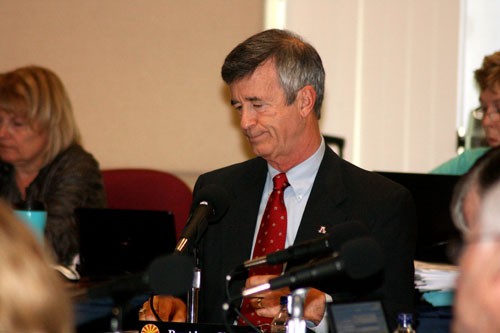The Arizona Board of Regents passed tuition and fee increases for Arizona students Thursday morning. The increases range between 10 and 20 percent for undergraduate, graduate, resident and non-resident students.
“”I wore my funeral suit,”” said regent Mark Killian on Thursday about tuition increases. Killian did, however, concede that tuition increases were necessary to maintain quality.
“”These are challenging times that require difficult decisions,”” UA President Robert Shelton said.
Shelton added that debt has remained consistent over the past three years for UA graduates, and more than half graduate without any debt.
UA resident undergraduate tuition for the 2010-11 academic year will be $8,237, a 20-percent increase. UA non-resident undergraduate tuition will be $24,596, a 10-percent increase. UA resident graduate tuition will be $9,027, an 18-percent increase. For non-resident graduate students, tuition will be $24,889, a 10-percent increase.
Regents rolled in a sustainability fee and an economic recovery fee into the cost of base tuition. The sustainability fee is $12, and the economic recovery fee is $766 for residents and $966 for non-residents. The regents called the move “”more transparent.””
According to Regent Anne Mariucci, education at the three universities in Arizona have “”been the world’s greatest bargain for the last 10 years, and it can’t be any more. It’s not on sale any more.””
There will be a $500 increase for resident undergraduate tuition and a $2,000 increase for non-resident undergraduate and graduate tuition at UA South.
The university will implement mandatory fees over the next two years, according to a memorandum Shelton sent to ABOR. Students will pay half the fee next year and the remaining portion the following year. It will cost students about $310 each academic year.
There will be an increased library/information technology fee of $160 per academic year. Of that, $90 will go towards sustaining the libraries, and $70 will go towards “”priority information technology needs,”” the memorandum said.
There is also a $150 Health and Recreation Fee per academic year. Most of the money will support Campus Health Services.
The current Campus Recreation Center Program Fee will continue, with $3 per semester.
Based on the increases in tuition and fees, the university estimates it will make approximately $45.5 million in net revenue, which will cover a portion of the $100 million deficit the UA is facing. The UA will set aside $1.8 million of its revenue, or 17 percent, for financial aid.
“”We are public universities, but we are seeing the erosion of what that means,”” said Regent Fred DuVal.
The university has also cut about $40 million in costs. Those figures would put the university $14.5 million short. Proposition 100 might make up the difference. Proposition 100 proposes a one-cent increase in state sales tax to support Arizona K-12 education.
All nine regents voted unanimously to increase tuition for students in the College of Medicine.
“”I have dream that, one day, this board will decrease tuition,”” said ABOR President Ernest Calderón.
Vice President for Student Affairs Melissa Vito, talked about the importance of residence halls Thursday afternoon, saying that the UA could accommodate between 70 and 80 percent of the freshman class, which she says would put the UA in the middle of the Pacific 10 Conference in terms of student housing. Vito said students who live in student housing graduate at higher rates and have better grades. The university’s request to increase the rates for residence halls passed eight to one. Residence hall rates were raised by about 7 percent across the board.
“”Last year, the UA campus went through a major reorganization that included the formation of new colleges, schools and departments through mergers and administrative reorganizations. This year, only one new unit reorganization is proposed,”” said UA Provost Meredith Hay.
Also approved was the UA’s academic strategic plan. The plan includes the formation of the School of Theatre, Film and Television, which is the merger of the current School of Theatre Arts and School of Media Arts — both in the College of Fine Arts — and the renaming of the School of Asian, Classical and European Studies to the School of International Languages, Literatures and Cultures.
The motion was passed unanimously.
Before concluding, the regents approved the appointment of B. Glenn George to UA vice president for legal affairs and general counsel, which will be effective May 17.









